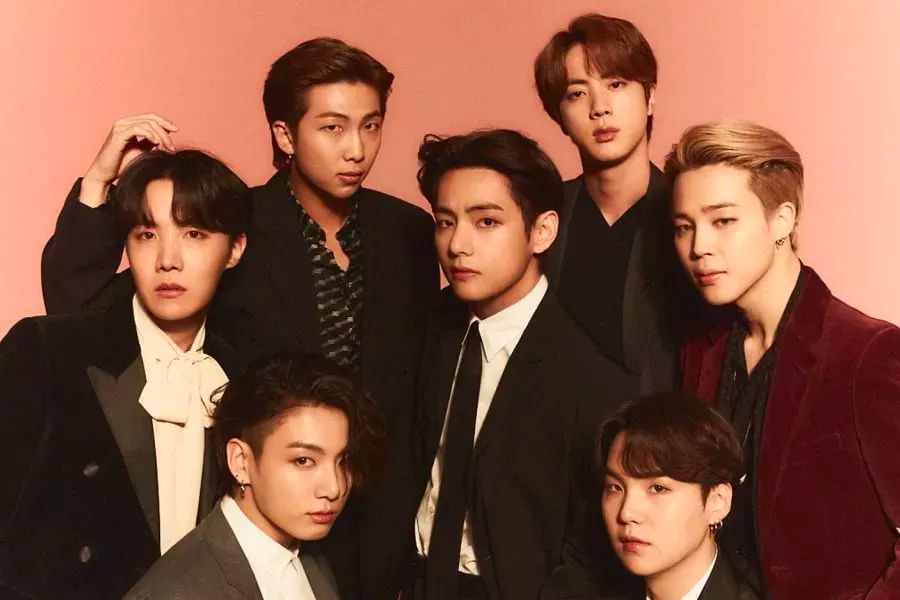
Chances are you’ve probably heard of BTS by now, that is, if you’re not living under a rock. BTS or Bangtan Sonyeondan is a South Korean boy band that has become a global phenomenon in recent years, and deservingly so.
The 7-membered group has released numerous chart-busting songs, won several prominent Korean and American music awards, and addressed the United Nations General Assembly twice. BTS is currently the only musical group to have 6 music videos with over 1 billion views on YouTube. The group has collected a jaw-dropping 23 Guinness World record titles, and it is estimated that the septet generates more than US$3.7 B for South Korea annually.
We could go on and on – but you get the point.
But how did this once nearly bankrupt boy band go on to become the flagbearer of the Korean Wave, the manifestation of South Korea’s growing soft power? Who is the mastermind behind this unmatched success in the music industry?
BTS is just one (admittedly, extremely crucial) piece in a much larger narrative of Hybe Corporation, formerly Bighit Entertainment. And can we just tell you that Hybe is unlike any other traditional entertainment company. At its heart lies innovation, content creation, and exceptional business acumen.
But we’re getting ahead of ourselves.
First things first.
Are BTS and Bighit even worth discussing? And are they note-worthy from an Indian perspective?
BTS, are a group of 7 South Korean men in their 20s, who have taken the world by storm. And all this, even though only one of them speaks English fluently. Their soon-to-be held concert in Los Angeles (the first in-person concert post-COVID) was sold out, even before the tickets went on sale for the general public. And mind you, that’s nearly 400,000 tickets sold within presale itself.
They are the global brand ambassadors for various leading brands like Louis Vuitton, Samsung, Hyundai and Fila, to name a few. If you’ve purchased a Samsung Galaxy mobile recently, you might be surprised to know that the music that plays when your mobile switches on (Galaxy’s signature song ‘Over the Horizon’) was, in fact, recently recreated by one of BTS’s members, Suga.
Social Media is another playing field for BTS, where they ‘trend’ frequently. The youngest BTS member Jungkook officially holds the record of the most-viewed individual hashtag on TikTok with over 70 billion views. One of his live streams earlier this year garnered a whopping 22 million real-time viewers. And that’s just talking about one BTS member. The septet together hold countless such records, across all social media platforms.
If we specifically talk about India, #BTS is one of the top 10 tweeted hashtags of 2021 in India. When Spotify launched in India back in 2019, BTS became the 5th most listened to artist on Spotify in India — and the only non-Indian one. And as of June 2021, BTS dominated the ‘Top 20 Singles Chart India’ (a chart that tracks the popularity of international songs in India) with three songs in the top 20. Their summer release ‘Butter’ claimed the 1st spot, ‘Dynamite’ 8th, and ‘Life Goes On’ featured at the 20th spot.
By the way, did we mention that their fandom is as big as they are? The BTS ARMY, as the fandom calls itself, is reportedly the largest fandom in the world.
In April this year, the Indian BTS ARMY raised over INR 20 Lakhs for COVID relief in less than 24 hours.
BTS started gaining international recognition in 2016-17 and since then, they’ve been the subject of multiple academic research and case studies, including one at Harvard Business School. And if that doesn’t convince you why we’re discussing them today, we’re not sure what will.
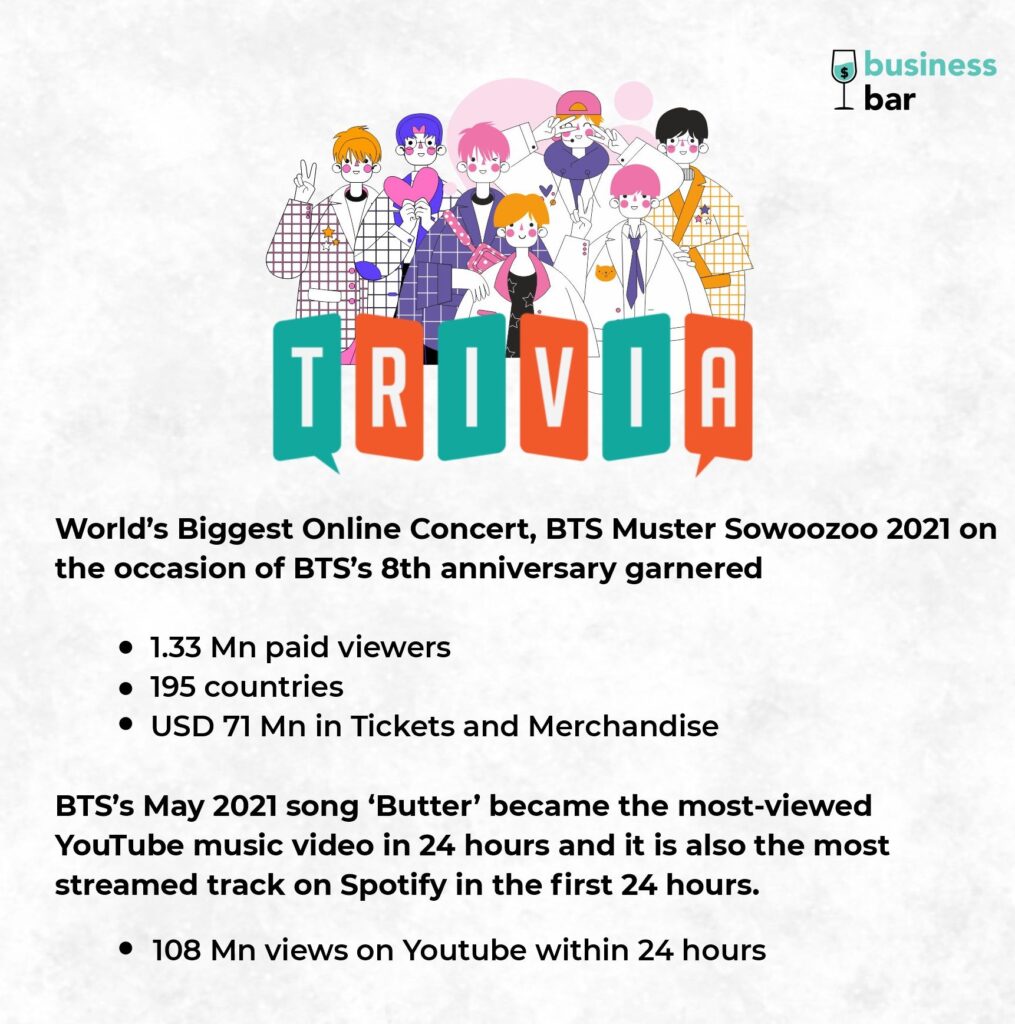
Before we dive deeper into the phenomenon that BTS is and the skillful orchestrator that Bighit Entertainment is, let’s take a look at the K-Pop Industry.
The K-Pop Industry
Since the 1990s, the K-Pop (Korean Pop) industry had been majorly dominated by the ‘Big Three’ entertainment companies, namely SM Entertainment, YG Entertainment and JYP Entertainment.
The industry predominantly worked (and still does) on a trainee model, popularized in Korea as a replication of the Japanese idol industry. What that means is that thousands of candidates, as young as 12-13 years old, would audition to become trainees for these entertainment agencies. This is then followed by the trainee period, which can last for years before the artists finally debut. The trainees often live together during this period, while they take vocal, rap, dance and language classes. The system has been heavily criticized for being restrictive and controlling of everything from the artists’ personal lives and visual appearances to the way they speak and behave in the public eye.
This process of finding and training trainees is quite expensive. Back in 2012, it was reported that the cost of training each member of SM Entertainment’s ‘Girls’ Generation’ was as high as US$3 M. Depending upon the contract terms, it often happens that if a trainee drops out voluntarily during the trainee period, they have to pay back all the training costs accumulated in the form of trainee debt. The situation isn’t much brighter for those who survive and ultimately debut after multiple evaluation rounds. As high as 40-60% of the artists’ earnings go to the entertainment agencies.
Much has been discussed about these harsh trainee contracts, and the industry has since then taken small steady strides in the right direction. In 2019, the industry generated over US$5.8 B in sales revenue, observed a growth rate of 17.9% and employed over 77K individuals.
Now that we have a flavor of how the industry works and how big it is – let’s take a closer look at Bighit, the company that manages BTS, and the one that disrupted the ‘Big Three’
Back to the Beginning
Back in 2005, Bang Shi Hyuk, a former composer at JYP Entertainment, had ventured out to form Bighit Entertainment. By 2007, the company was on the verge of bankruptcy but managed to stay afloat, thanks to the two groups, 8eight and Glam (co-managed with Source Music) that became moderately successful. In 2010, Bighit started to assemble the group it would call BTS, and the process itself took over two years. During this period, the seven BTS members shared a single dorm room, owing to the company’s financial situation.
So in 2013, as the industry reeled from the massive global success of Psy’s ‘Gangnam Style’, a budding boy band was getting ready to debut.
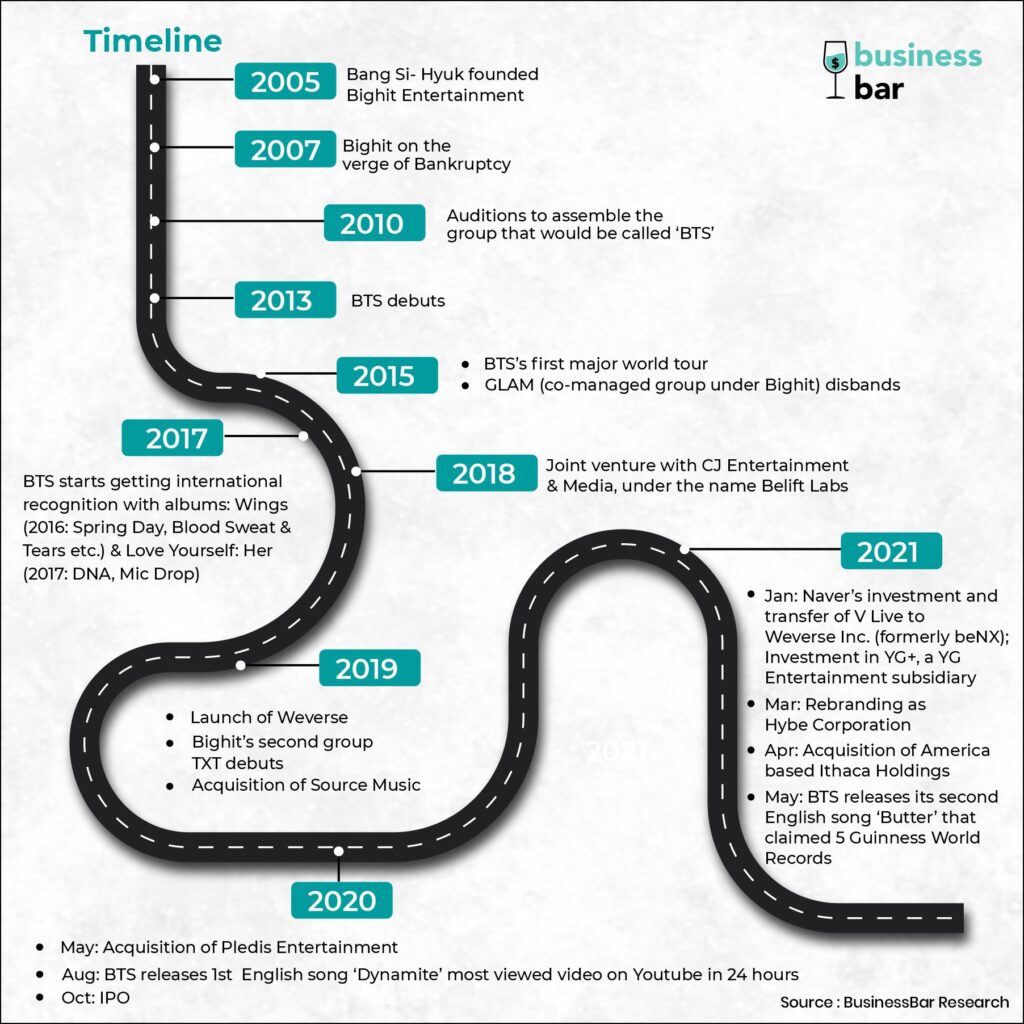
Foundation Blocks of a Music Powerhouse
It wouldn’t be wrong to say that BTS is the result of Bang’s attempt to change the industry inside out. First and foremost, Bighit vouched for the creative freedom and personal expression of their artists. BTS initially debuted as a Hip-Hop group, but later shifted to the positioning of a Pop band with a socially conscious messaging. While much of their eventual success can be credited to the fact that the members are all exceptionally talented, the critical reason why their songs resonate with so many people across different demographics is that, they talk about contemporary social issues, including mental health and self-love.
The group came across as raw and real, at a time when the K-Pop industry mostly seemed toxic and superficial. And that is why their music is seemingly able to transcend the barriers of languages, age groups and nationalities.
Moreover, while traditionally, the entertainment companies focused on distribution via television and physical album sales, Bighit decided to leverage the power of the internet. YouTube allowed for cheaper distribution and exponential reach. Spin-off series such as Run BTS, Break the Silence, and Bon-Voyage further allowed fans to know more about their favorite BTS members and establish a closer connection with them. Innovation and content creation have evidently been at the core of Bighit, since its early days.
By 2017, BTS began to get significant international recognition, and it paid off, quite literally. In 2017, the company reported a net profit of US$22.9 M, an increase of 172.7% from 2016.
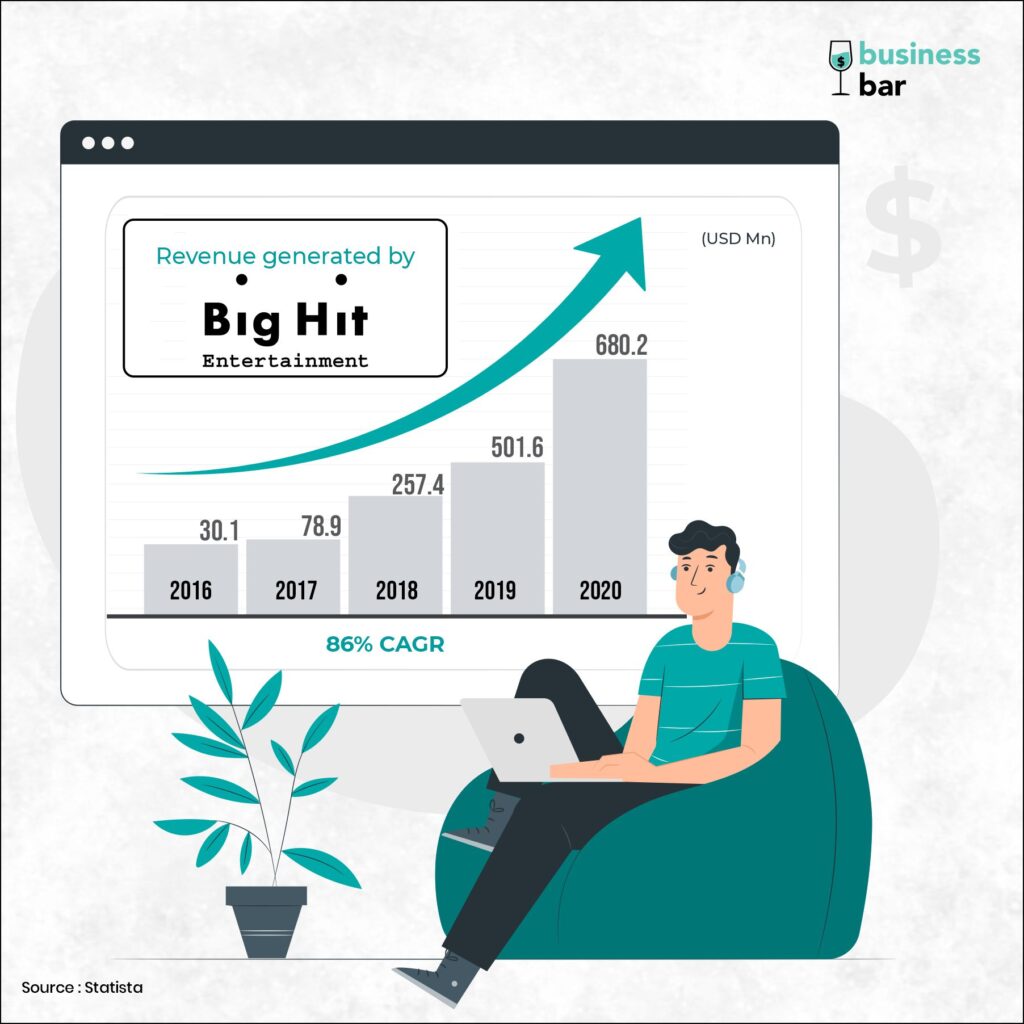
Evolution of Bighit Entertainment
With staggering growth arose unique challenges.
At the time, almost 80% of Bighit’s profits came from advertisements and album sales directly driven by artists’ activities. This wouldn’t be so much of a problem had there not been a mandatory military service that the BTS members would soon be due for. Moreover, apart from BTS, the company only had one other solo artist, Lee Hyun (a former member of 8Eight), under its wings.
The answer was quite clear – Revenue stream diversification via by expanding the company’s artist portfolio and by establishing revenue streams that would not require the direct involvement of the artists.
Hence, to execute with the former strategy, in March 2019, Bighit debuted its second male group TXT (Tomorrow by Together). Throughout 2018-20, the company went on a spree of acquisitions and joint ventures with Korean entities:
- Aug 2018: Joint venture with CJ Entertainment & Media, under the name Belift Labs
- July 2019: Acquisition of Source Music
- May 2020: Acquisition of Pledis Entertainment
- Nov 2020: Acquisition of KOZ Entertainment
Interestingly, the company also acquired Superb, a video game company in Aug 2019, but more on that later. Furthermore, as a part of its latter strategy, Bighit established alternate sources of revenue, ones that didn’t rely as much on the artists. This was majorly done in two ways:
1. IP Expansion: In one of his interviews, the General Manager of Bighit’s IP division had explained, “Big Hit IP took the artists’ music, photos, music videos and other source IPs to expand to secondary IPs such as characters, universes, and music-based IPs, and built business models on this foundation.”
One of the classic examples of this is ‘Tiny Tan’, a series of animated BTS characters. Several music videos of BTS songs featuring Tiny Tans have been released. Bighit has also forged several partnerships to leverage these.
- Launched Tiny Tan figurines for sale in collaboration with Mattel, an American Multinational Toy company
- Introduced the Tiny Tan theme and 360 AR backgrounds accessible on Messenger and Instagram, in collaboration with Facebook.
- Introduced a Tiny Tan series of Mobile phone accessories in partnership with KHVATEC, a leading electrical components & module manufacturing company and if all of that wasn’t enough, these Tiny Tan characters also became the face of the South Korean Fabric Softener brand, Downy.
In May 2021, the company also collaborated with the International Korean Language Education Foundation (IKLEF) to develop Korean-language textbooks for distribution to overseas elementary and secondary schools through the Ministry of Education. ‘Learn Korean with BTS’ is another such educational initiative undertaken by the company to leverage the band’s role in the growing international interest in Korean culture and language.
2. Investment in Innovation and Technology: One would not expect a music entertainment company to develop social media apps, video games and language curriculum. Well- that’s Bighit for you.
- Weverse, or as the company calls it, ‘Platform-based Bighit ecosystem’, is a one-of-a-kind platform that lets fans interact with their favourite K-Pop groups, purchase albums & merchandise, and even buy tickets for virtual concerts.
- Since its launch in 2019, most prominent K-Pop groups have already jumped on the Weverse bandwagon. 17 Mn users had installed the application as of December 2020.
- If you’re still underestimating the platform, here’s a testament to how big and multipurpose it is. Earlier this year, BTS hosted its annual Muster Swoozo Concert virtually, breaking its own record from last year. The concert garnered over 1.33 million paid viewers from 195 countries and brought in over US$71 M from ticket & merchandise sales. And all of this, from purchasing tickets to hosting the concert, was done on Weverse.
- In a US$320 M deal, Naver (the Google of South Korea) invested in Bighit’s technology subsidiary beNX, to strengthen its fan community. beNX had previously acquired Naver’s V Live (a live streaming platform, similar to Instagram live, developed especially for celebrity-fan engagement)
- Through the acquisition of Superb, a company specializing in multi-platform music games, Bighit ventured into launching BTS’s own mobile game called BTS World, which introduces the BTS universe and lets the user virtually interact with the members.
As a result, the profits from these alternate revenue streams ended up accounting for nearly 45% of its total profits in 2019, as compared to ~20% in 2017. And hence, a more sustainable and resilient business.
It is no surprise why the company was able to fare the pandemic superbly! When the revenue from concerts fell by over 98%, the company managed to not only stay afloat, but recorded a 36% growth in revenue in 2020. Furthermore, Bighit reported a 2160% (86% CAGR) revenue growth from 2016 to 2020.
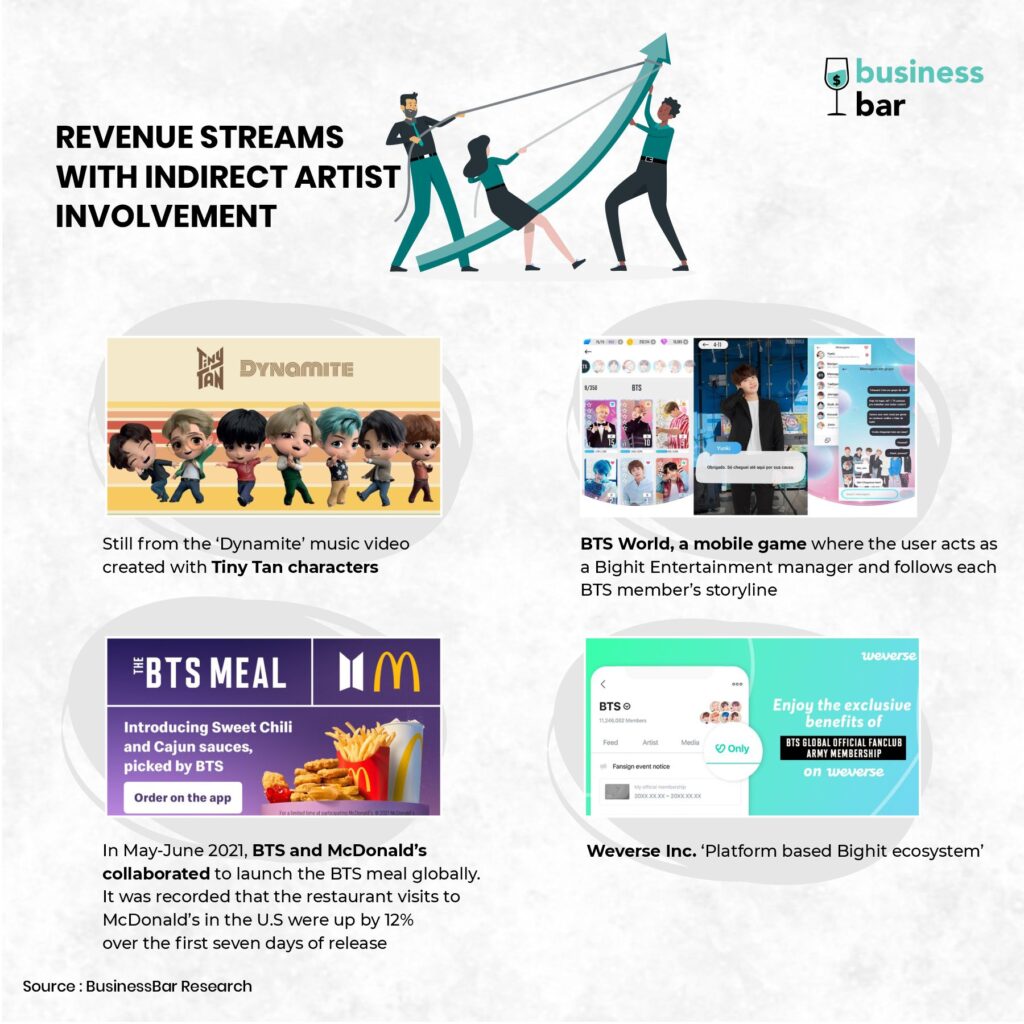
The IPO
Bighit captured the attention of the music world when it went public in October 2020. It became the biggest IPO on the Korean Exchange, since 2017. The company issued shares at ~US$115, though it ultimately opened at a share price of ~US$235, valuing the company at a whopping US$7.5 B. As of October 2021, the company (now registered as Hybe Co. Ltd.) is valued at US$10.5 B. Founder CEO Bang Shi Hyuk, who owns ~35% stake, currently has a net worth of US$3.5 B, a far cry from his near bankruptcy in 2007.
Hybe Corporation: The New and Transformed Bighit
Let’s admit it. A lot had been happening at Bighit. Post the IPO, things remained as dynamic as before.
By this point, Bighit’s earnings were actually more than the earnings of the ‘Big Three’ combined. Things came back full circle when Bighit announced its US$63 M investment into YG Entertainment, the Black Pink promoter and one of Bighit’s biggest competitors. The deal was positioned as a strategic collaboration to create synergy by leveraging technology and artists’ IP in a wide range of applications.
Owing to the vast expansion of Bighit beyond the activities of a traditional entertainment company, a repositioning of Hybe Corporation was announced starting March 2021. Hybe’s motto is ‘We believe in music’. The company has three major divisions: Hybe Labels, Hybe Platforms and Hybe Solutions. Bighit Music is now one of the labels under Hybe Labels.
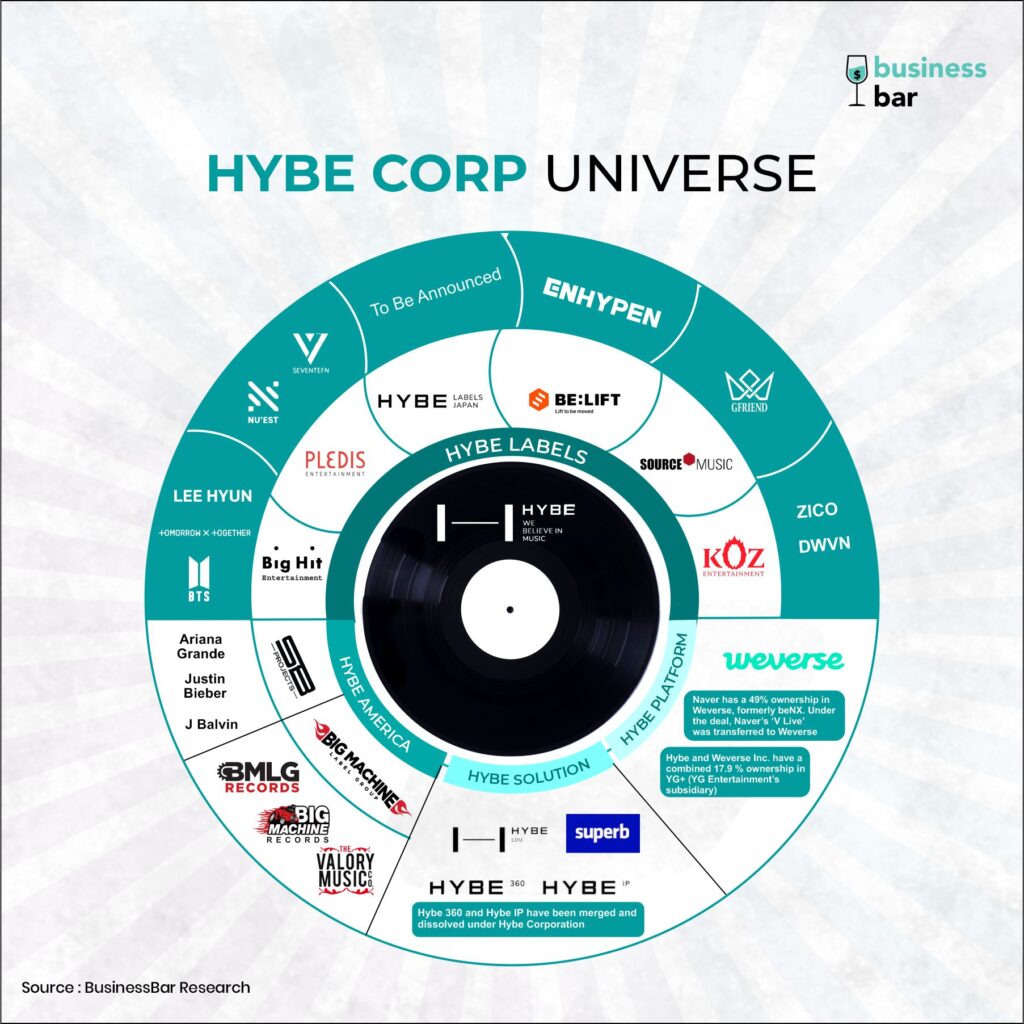
In April 2021, Hybe acquired the American music company ‘Ithaca Holdings’ in a US$1.05 B deal. Ithaca Holdings, now Hybe America, manages the likes of Justin Bieber, Ariana Grande and Demi Lovato. A separate subsidiary, Hybe Labels Japan, has also been established for operations in Japan.
Following the organisational restructuring in July ‘21, Bang Shi Hyuk stepped down as the CEO, claiming to focus on music production and transitioning into the role of Chairman of the company.
While the future looks optimistic for the Korean music powerhouse, it remains to be seen how it fares when BTS members’ depart for their military service as early as December 2022. Will it be able to replicate the success of BTS with its other groups? Will the leadership change become a piece in a bigger puzzle? Only the future will tell!
While BTS & Bighit have together smashed open the doors of K-Pop to the entire world, other groups like Black Pink, Exo etc., have also strengthened their foothold over this global audience. K-Dramas have become incredibly popular, thanks to Netflix, with the latest addition being the Squid Game. Parasite, a popular Korean movie’s multiple wins at the 2020 Oscars, only added to the momentum that has been building for over a decade. This stellar growth in fascination towards Korean culture and content in recent years has led to a significant boost to the South Korean economy, translating its goal of becoming a soft power hub into reality.
But that’s a story for another day!
This piece is contributed by Rutvi Narang
Recommended Articles:

Hello,
Best music MP3/FLAC VIP https://popeurope.blogspot.com scene music releases.